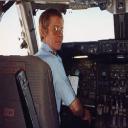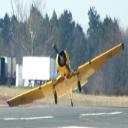Yahoo Answers is shutting down on May 4th, 2021 (Eastern Time) and beginning April 20th, 2021 (Eastern Time) the Yahoo Answers website will be in read-only mode. There will be no changes to other Yahoo properties or services, or your Yahoo account. You can find more information about the Yahoo Answers shutdown and how to download your data on this help page.
Trending News
Does anybody know(or where I can find out)if a alot of ex WW2 bomber pilots became airline pilots?
Did a lot of these guys go on to be the first generation of jet and turboprop airline pilots,or did most just go back to their "regular job" after the war.If there were any most would have retired in the late seventies/early eighties I would imagine.Also would the transition from a WW2 heavy bomber like a B17,Lancaster,Halifax,B29....ect,to a first generation jet airliner or perhaps even a modern jet airliner(glass cockpit) be easier than a fresh CPL/IR with 250 hoursTT,who's perhaps only flown nothing bigger and more complex than a Piper Seneca ?
4 Answers
- Skipper 747Lv 77 years agoFavorite Answer
Most of my first captains (then 707 and 727 with Pan Am) were ex-WW.2 pilots -
They were often ex-B-17, B-24, C-46, C-47 or C-54 pilots -
With Pan Am they had been DC-4, DC-6/7 or Boeing 377 first officers then captains -
I recall a 707 captain, had flown the Boeing 314 seaplanes -
Getting into jets was a new game for them -
Some had a hard time transition from DC-6/7 into 707 or 727 -
Even some failed the transition, and were kept on the DC-6 as long as they were operating -
Finally flying first officer on B-727... some eventually became captains...
Some (not many, but a few) were "retired" -
An airline jet does not fly like any large propeller airplane -
The handling is completely different -
Not "more difficult", just "different" -
I had problems with some captains, in particular on 707 -
With 1,000 hrs experience on Air Force KC-135 (707) I tried to help and give advice -
That was not well received by some of them, who barely had 100 or 200 hrs jet time -
One even refused to fly with me on his crew -
I never flew large propeller airliners - like the DC-6 (complicated machines to me) -
For me, flying a jet were normal airplanes - and so easy to handle -
I found myself in a similar situation at a much later time in my career -
I was captain and instructor 747-200 -
Then arrived the 747-400 with no flight engineer, and glass cockpit -
I refused to transition to the 400 and remained on the 200 until l retired -
Sorry - I liked "steam powered gauges" -
And the most important crewmember - a flight engineer - I do not need a first officer -
I understood then what my old time captains felt in the 707 and 727...!
Source(s): Retired old fart - - 7 years ago
(1) Many did, but more transport pilots became airline pilots after the war than bomber or fighter pilots, and many of them were already airline pilots before the war. There was such a glut of pilots after the war the actual percentage of wartime pilots who ended up flying for an airline is low.compared to the number of pilots trained.
(2) Most of the WWII pilots retired by 1980, long before the glass cockpit appeared in airliners.
(3) Most WWII pilots flew the large prop-liners before the jets appeared and yes, they had a far easier time transitioning than a 250-hour light plane pilot would. Large aircraft handle far differently than small ones, and the difference in complexity is like night and day.
- Howard LLv 77 years ago
Define "a lot". There were almost 200,000 pilots in the US military in 1945. Not all of them were bomber pilots but many fighter pilots went on to to fly for the airlines. There were probably less than 10,000 pilots flying for US airlines through about 1950. Obviously the vast majority never flew for the airlines.
- Warbird PilotLv 77 years ago
The airlines liked the multi-engine, crewed time. While they would hire fighter guys, that's was not always what they were looking for.






